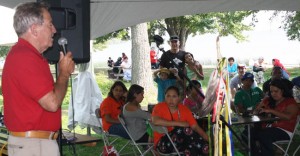Education hot topic for minister to handle

By Marci Becking
NIPISSING FN – Grand Council Chief Patrick Madahbee reminded Aboriginal Affairs Minister David Zimmer at an Aug. 21 bilateral meeting of the importance of an Anishinabek Nation education process.
“We need to find a way to respect each other’s process and jurisdiction,” said the Grand Council Chief. “Meeting at the bilateral table is one way we can work toward that. Our relationship stems from the commitments the Crown made at the Royal Proclamation to stop a war and create allies.”
Madahbee said the nation-to-nation relationship between Canada and First Nations was formally recognized by the Proclamation, which was issued 250 years ago this Oct. 7.
The Grand Council Chief and provincial cabinet minister discussed issues such as infrastructure and energy sources for Anishinabek communities, the slow movement progress being made on implementing recommendations of the Ipperwash Inquiry Report , and the deteriorating relationship between Anishinabek Nation communities and the Ontario Provincial Police.
Minister Zimmer acknowledged that the issue of education and policing that were brought up at the bilateral table and also at the Eshkeniijig (youth) Engagement conference were directly related to the Ipperwash recommendations.
He said “ the Ipperwash recommendations are on my ‘to-do’ list,” along with negotiations with First Nations on sharing the rich mineral resources from Northern Ontario’s “Ring of Fire”.
The youth asked Minister Zimmer what Ontario could do to help traditional learning in the public school system.
“You should all become teachers,” said Minister Zimmer, later adding that curriculum changes and teaching the teachers would also help traditional learning in schools.
Other topics discussed with the youth were environmental issues and health care.
Quinn Meawasige, newly-elected Anishinabek Nation Youth representative, said that the youth were well-equipped with a line of questions to ask Minister Zimmer.
“I got the message from our youth that Minister Zimmer did not quite answer our questions,” said Meawasige, “It seemed as if he did not give us youth any direct answers. In the end, when Minister Zimmer left the gathering, our youth had the same questions they had when he arrived.”
Lake Huron Regional Chief Isadore Day who attended the youth question-and-answer session said that it was a good first step for Minister Zimmer to take time to meet with the Anishinabek youth, but that words needed to be followed up by action.
“We must provide a source of hope for our youth that will fuel their resolve and efforts to take initiative and responsibility for their own path forward,” said Day. “We strongly urge the Minister and staff to return back to the table sooner than later with a list of short-term efforts and actions toward the success that our youth are demanding. Youth understand the dire condition of First Nation jurisdiction and they want a future where Ontario respects First Nation jurisdiction, government and institutions. Our youth want a true government-to-government relationship that signals successful Anishinabek Nationhood.”
Grand Council Chief Madahbee thanked the youth for keeping Minister Zimmer on his toes.
“You took the minister to task and asked tougher questions than we did at the bilateral meeting,” said Madahbee.


